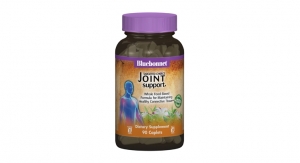02.20.19
Achilles tendon problems are one of the main causes of long-term absence from sports and show high recurrence rates. A new study shows that a special peptide from collagen can accelerate the benefits of a return-to-running program by promoting the natural healing process.
A recent study performed by the Australian Institute of Sport (AIS), published in January 2019 in the peer-reviewed journal Nutrients (Praet et al. 2019), has shown that supplementation with a specific bioactive collagen peptide, combined with a rehabilitation exercise program, significantly reduced both pain and functional limitations in participants suffering from Achilles tendon injury.
The majority of the study participants had a long history of Achilles tendinopathy, not responding to rest or other traditional physiotherapy regimes. However, with the aid of the special collagen peptide, 12 out of the 18 participants who finished the study were able to return to their desired running sport in just three months.
The double-blind, placebo-controlled study used TENDOFORTE, a recent addition to the GELITA range of Bioactive Collagen Peptides. Derived from collagen protein, TENDOFORTE is a bioactive peptide that is unique in its mode of action. The product has been optimized to stimulate the biosynthesis of new extracellular matrix proteins for healthy tendons and ligaments at a daily dose of only five grams.
In the study, participants were given a placebo (maltodextrin) or TENDOFORTE in combination with bi-daily eccentric calf-strengthening exercises for six months, using a crossover design. Group AB received specific collagen peptides for the first three months before crossing over to the placebo, whereas Group BA received the placebo first before crossing over to the specific collagen peptides. At baseline and after three and six months, all patients were asked to rate their subjective Achilles tendon pain and functional limitations using a Victorian Institute of Sports Assessment–Achilles (VISA-A) questionnaire. Scores increased significantly in group AB (12.6) compared with 5.3 in group BA. After crossing over, both groups showed significant improvements in VISA-A of 5.9 (AB) and 17.7 (BA).
In real-life examples, subjects with long-term symptoms of chronic Achilles tendinopathy were able to return to training within three months when supplementing with TENDOFORTE and were able to keep running for the remainder of the study period. The authors concluded that oral supplementation with specific collagen peptides may accelerate the clinical benefits of a well-structured calf-strengthening and return-to-running program. In summary, the risk of injury decreases considerably whilst flexibility improves.
These results add to the outcomes of the first study on TENDOFORTE, which looked into the ability of TENDOFORTE to reduce ankle sprains and improve ankle stability. Six months of supplementation with the specific collagen peptide resulted in significant improvements in ankle stability, reduced ankle sprains and a reduced re-injury rate in the three month follow-up period, suggesting long-term injury protection with TENDOFORTE (Dressler et al.J Sports Sci Med, 2018).
“These studies reveal TENDOFORTE as the very first nutritional solution that goes to the root of the problem. Its bioactivity influences tenocyte cell metabolism, promoting the natural, sustained healing process,” said Suzane Leser, director of nutrition communication at GELITA AG.
She further explained: “The incidence of overuse injury in sports has risen, not only because of the greater participation in recreational and competitive sports but also as a result of the increased duration and intensity of training, creating a real need for nutritional strategies to strengthen the connective tissue.”
A recent study performed by the Australian Institute of Sport (AIS), published in January 2019 in the peer-reviewed journal Nutrients (Praet et al. 2019), has shown that supplementation with a specific bioactive collagen peptide, combined with a rehabilitation exercise program, significantly reduced both pain and functional limitations in participants suffering from Achilles tendon injury.
The majority of the study participants had a long history of Achilles tendinopathy, not responding to rest or other traditional physiotherapy regimes. However, with the aid of the special collagen peptide, 12 out of the 18 participants who finished the study were able to return to their desired running sport in just three months.
The double-blind, placebo-controlled study used TENDOFORTE, a recent addition to the GELITA range of Bioactive Collagen Peptides. Derived from collagen protein, TENDOFORTE is a bioactive peptide that is unique in its mode of action. The product has been optimized to stimulate the biosynthesis of new extracellular matrix proteins for healthy tendons and ligaments at a daily dose of only five grams.
In the study, participants were given a placebo (maltodextrin) or TENDOFORTE in combination with bi-daily eccentric calf-strengthening exercises for six months, using a crossover design. Group AB received specific collagen peptides for the first three months before crossing over to the placebo, whereas Group BA received the placebo first before crossing over to the specific collagen peptides. At baseline and after three and six months, all patients were asked to rate their subjective Achilles tendon pain and functional limitations using a Victorian Institute of Sports Assessment–Achilles (VISA-A) questionnaire. Scores increased significantly in group AB (12.6) compared with 5.3 in group BA. After crossing over, both groups showed significant improvements in VISA-A of 5.9 (AB) and 17.7 (BA).
In real-life examples, subjects with long-term symptoms of chronic Achilles tendinopathy were able to return to training within three months when supplementing with TENDOFORTE and were able to keep running for the remainder of the study period. The authors concluded that oral supplementation with specific collagen peptides may accelerate the clinical benefits of a well-structured calf-strengthening and return-to-running program. In summary, the risk of injury decreases considerably whilst flexibility improves.
These results add to the outcomes of the first study on TENDOFORTE, which looked into the ability of TENDOFORTE to reduce ankle sprains and improve ankle stability. Six months of supplementation with the specific collagen peptide resulted in significant improvements in ankle stability, reduced ankle sprains and a reduced re-injury rate in the three month follow-up period, suggesting long-term injury protection with TENDOFORTE (Dressler et al.J Sports Sci Med, 2018).
“These studies reveal TENDOFORTE as the very first nutritional solution that goes to the root of the problem. Its bioactivity influences tenocyte cell metabolism, promoting the natural, sustained healing process,” said Suzane Leser, director of nutrition communication at GELITA AG.
She further explained: “The incidence of overuse injury in sports has risen, not only because of the greater participation in recreational and competitive sports but also as a result of the increased duration and intensity of training, creating a real need for nutritional strategies to strengthen the connective tissue.”























